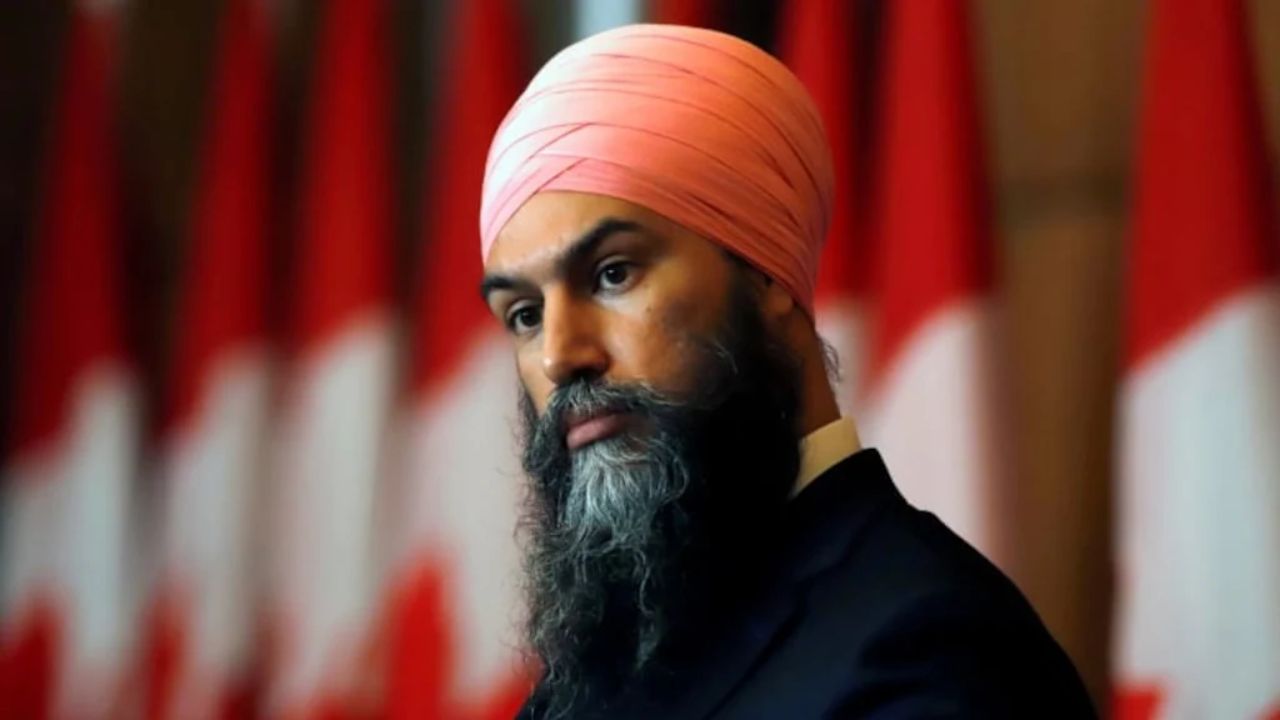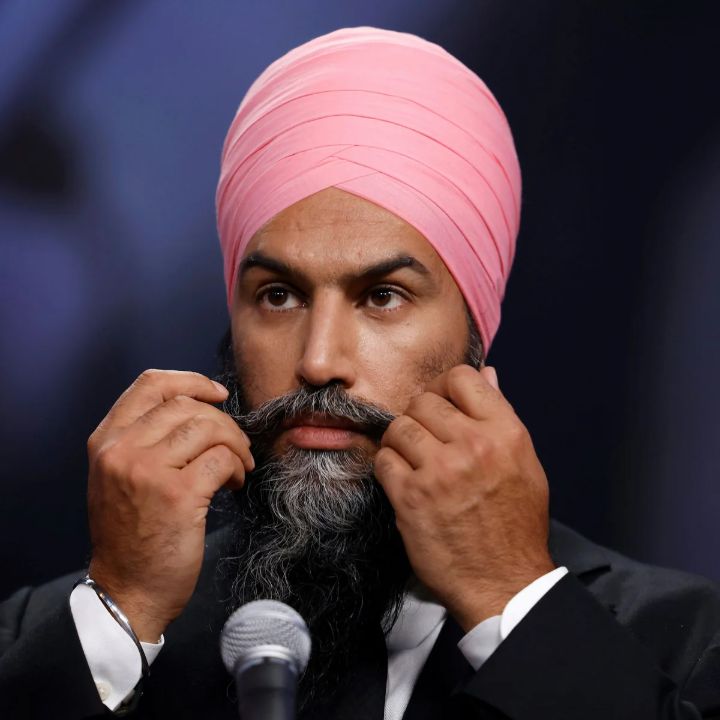Jagmeet Singh Net Worth: How Much Is The NDP Leader Worth?
What does the financial tapestry of a political figure truly reveal? Jagmeet Singh's net worth, a subject of considerable public interest, offers a fascinating lens through which to examine his career trajectory, his policy stances, and the complexities of wealth in the realm of Canadian politics.
Discussions regarding Singh's financial standing are commonplace on platforms like Reddit, where users often dissect his progressive policies and advocacy for wealth redistribution. This inevitably leads to comparisons with other prominent politicians, including Prime Minister Justin Trudeau and Conservative leader Pierre Poilievre. The scrutiny extends beyond mere figures; it delves into the perceived alignment between Singh's actions, his stated ideals, and his personal wealth. Such scrutiny is not unique to Singh, as it is the norm across the political spectrum, and a necessary aspect of a healthy democracy.
To understand the nuances of his financial situation, it's essential to examine various aspects of his career and financial portfolio. As the leader of the New Democratic Party (NDP), Singh's primary income stream is his salary as a Member of Parliament. Furthermore, his background as a criminal defense lawyer prior to entering politics and any potential book sales or real estate investments contribute to his overall net worth. However, it is difficult to pin down an exact figure, estimates vary widely depending on the source. Understanding these factors helps paint a more comprehensive picture of Singh's financial standing.
- Find Your Big Swiss Mountain Dog Puppies More
- Layla Jenner Bio Career Latest Updates What You Need To Know
| Attribute | Details |
|---|---|
| Full Name | Jagmeet Singh |
| Date of Birth | January 2, 1979 |
| Place of Birth | Scarborough, Ontario, Canada |
| Education | University of Western Ontario (B.Sc.); Osgoode Hall Law School (J.D.) |
| Profession | Politician, Lawyer |
| Political Party | New Democratic Party (NDP) |
| Political Positions | Leader of the NDP (since 2017), Member of Parliament for Burnaby South |
| Salary (approximate) | $271,700 per year (as of April 1, 2024) |
| Net Worth (estimated) | Estimates vary widely, ranging from $4 million to $78 million. |
| Sources of Income | MP Salary, Previous Legal Career, Potential Investments, Book Sales |
| Key Policies/Ideology | Social Justice, Wealth Redistribution, Environmental Protection, Indigenous Rights |
| Family | Married to Gurkiran Kaur Sidhu, has a daughter. |
| Height | 5' 10" |
| Reference | Parliament of Canada |
Singh's ascent into the political arena began with a background in law. Before entering the world of politics, Singh was a criminal defense lawyer, honing skills in advocacy and negotiation that would serve him well in his future career. This experience provided him with a unique perspective on social justice issues and the intricacies of the legal system, shaping his commitment to defend those often marginalized in society.
His entry into politics marked a significant shift. Elected as a Member of Provincial Parliament (MPP) in Ontario in 2011, Singh quickly became a prominent figure within the provincial NDP. He then transitioned to federal politics, winning a seat in the House of Commons as the Member of Parliament for Burnaby South in 2019. This transition highlighted his ambition and his ability to connect with voters across different regions of Canada.
As the leader of the NDP, Singh has consistently advocated for policies aimed at wealth redistribution, social justice, and environmental protection. His platform resonates with a significant portion of the Canadian electorate, who are attracted to his strong stances on issues such as climate change, affordable housing, and Indigenous rights. Singh's ability to articulate his vision and connect with diverse communities has solidified his position as a key player in Canadian politics.
Public perception of Singhs net worth is often colored by his political stance. Singh, like all politicians, is subject to the scrutiny of the public, especially given his emphasis on social justice and wealth redistribution. This includes examining how his personal wealth aligns with his public policy statements. Some critics argue that his financial success might create a disconnect between him and the average Canadian, potentially weakening his credibility among the electorate.
It's worth noting that, as per the provided information, Singh expensed over $500,000 to run his constituency office over a period of nine months. While this expense underscores his commitment to serving his constituents, it also opens up questions about financial management, accountability, and the efficient use of public funds. Any elected official must be prepared for the inevitable scrutiny of their financial dealings.
Moreover, it is worth noting, that the salaries of Members of Parliament have a significant impact on their overall financial standing. Following a salary increase on April 1, Members of Parliament, including Singh, experienced adjustments to their annual compensation. As of April 2024, Singh's annual salary is approximately $271,700. While these earnings position him favorably compared to the median Canadian income, they are also the subject of debate, particularly in times of economic uncertainty.
The financial landscape surrounding Singh is also reflective of the costs associated with political campaigns. It is not uncommon for high-profile politicians to incur significant expenses for campaigning, from staffing costs to advertising. During these times, Singhs office has been subject to scrutiny for salary costs, which have, on occasion, been observed to exceed those of his political counterparts. These disparities are often tied to the size and scope of an office and the responsibilities undertaken by the MP, but they highlight the intricate financial operations inherent in Canadian politics.
The sources of information regarding Singh's net worth are varied. Some media outlets provide estimates, which can differ widely. These estimates often consider his salary as an MP, his previous career as a lawyer, and any potential investments or assets. However, calculating a precise net worth is inherently challenging, as private financial information is not always publicly available. Different valuation methods, data sources, and assumptions can lead to different figures, explaining why these estimations may fluctuate.
The variance in net worth estimations, between figures like $4 million and $78 million, indicates the complexities in accurately assessing Singh's financial status. The wide range may be attributable to data discrepancies, or the types of assets taken into account, as well as the sources and methods used to gather and assess the data.
It's crucial to approach these figures with a degree of caution. The often-cited estimates of Singh's net worth are just that: estimations. Without full transparency of all assets, an exact figure remains elusive. The variance in the estimates underscores the difficulties in assessing personal wealth and the importance of critical thinking when evaluating such information.
Singh's approach to wealth redistribution is an integral component of his political platform. He is an advocate for policies such as increased taxes for high-income earners and corporations, expanded social programs, and investments in affordable housing. These policies reflect his commitment to reducing economic inequality and ensuring a more equitable distribution of wealth. They are meant to address the economic challenges that many Canadians face, and are a central theme of his political work.
Singh's commitment to social justice extends beyond his financial policies. He has consistently championed issues related to human rights, diversity, and inclusion. Singh's focus on these issues is evident in his actions and his statements, making them defining characteristics of his political identity. For example, Singh has expressed his commitment to Indigenous issues, aligning himself with causes such as reconciliation and addressing historical injustices, and his wife Gurkiran Kaur Sidhu, accompanied him at a campaign stop at the Cowessess First Nation in southern Saskatchewan to show support.
Singh's leadership of the NDP since 2017 marks a pivotal moment in his career. As the first Sikh to lead a major federal political party in Canada, he has broken barriers and brought a unique perspective to the political landscape. His leadership has involved navigating challenges, building consensus, and advocating for his party's vision. Singh has become a prominent political figure, and his leadership style is frequently discussed and scrutinized.
Singh's public image is carefully crafted, and it is not unusual for politicians to leverage their personal stories to connect with voters. Singh's journey from a criminal defense lawyer to a prominent federal politician reflects his commitment to social justice. The portrayal of his life experiences and beliefs can significantly influence public opinion, shaping how voters perceive his character and political platform.
The influence of social media and online platforms on the discussion around Singh's net worth is significant. Platforms such as Reddit, Twitter, and Facebook provide forums for users to discuss his financial affairs and political stances. These platforms disseminate information and shape public opinion, though not always accurately. Social media's power to amplify both positive and negative views of a politician's wealth underscores the importance of media literacy.
Singh's background in law continues to shape his approach to politics. His legal training equips him with the skills to analyze complex issues, advocate for his positions, and navigate the intricacies of policy debates. This legal background contributes to his understanding of legal and societal issues, helping him to bring a unique perspective to the political arena. It is also an essential aspect of the public's consideration of his policies.
Furthermore, Singh's role as a Member of Parliament for Burnaby South offers insight into the financial dynamics of public service. His salary, expenses, and interactions with constituents are all part of the public record. The allocation of resources, decisions on funding projects, and the management of his constituency office are all subject to scrutiny. Singhs performance in representing the interests of the people and allocating resources effectively is critical to assessing his suitability for political office.
Comparing Singh's financial situation to that of other political leaders, such as Justin Trudeau and Pierre Poilievre, is a common practice. These comparisons often highlight differing approaches to wealth, economic policies, and the values they represent. Such comparisons reflect the complexities of how different political leaders handle issues of finance and social justice, and influence public discussions.
The dynamics of wealth distribution in Canada are central to discussions about Singh's financial standing. The focus on social justice and wealth redistribution, forms a core principle of his political platform. He advocates for policies that aim to address income inequality and support those in need, reflecting a broader societal conversation about economic fairness and social mobility.
The political career of Jagmeet Singh, from criminal defense lawyer to prominent federal politician, highlights the multifaceted nature of his public service. His journey showcases not only his rise in Canadian politics but also his dedication to addressing social issues. Singhs focus on social justice and wealth redistribution has made him a significant figure in Canadian politics, making the conversation around his financial situation one that will be examined for years to come.
- Layla Jenner Controversy Facts You Need To Know Latest Updates
- Insights On Dr Umar Johnson Related Topics Must See

Jagmeet Singh Net Worth 2025 Inside His 4 Million Fortune

Jagmeet Singh Net Worth 2025 Inside His 4 Million Fortune

Jagmeet Singh's Net Worth How He Made His Money & Career